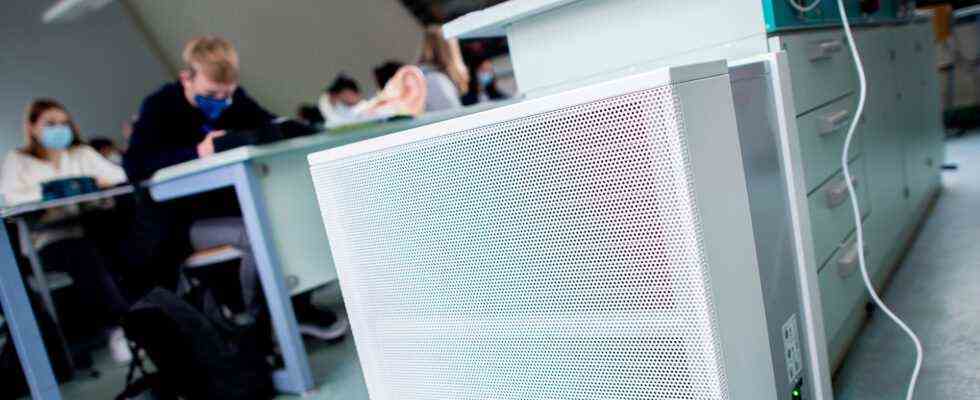As of October 12, 2021 10:04 a.m.
Authorities and inconsistent tendering rules blocked the use of air purifiers in schools for months. Manufacturers’ business is now booming. Occasionally there are already bottlenecks.
Sales manager Ralph Michael Gehlhar from the Daikin subsidiary AAF-Lufttechnik in Heppenheim in the Odenwald did not expect such a sudden run on mobile air filters. “We are currently barely keeping up with the demand,” he explains. Due to bottlenecks in filters, some devices could only be delivered with a delay. To date, Daikin claims to have sold more than 10,000 air purifiers to schools in Germany and is one of the market leaders.
“Market as if swept empty”
“The market has been swept clean,” confirms sales manager Rebekka Deck from UlmAIR, one of the largest suppliers of air purification devices. Bavaria in particular had already made extensive tenders in August and ordered enormous quantities. In the case of high-performance devices with a large volume of air, there are delivery delays of up to six months because the delivery of individual device parts is stagnating. Federal states like Hamburg are therefore currently ordering smaller devices, according to industry experts.
The booming air purifier industry presented itself last week at the Indoor Air trade fair in Frankfurt. A good 100 exhibitors showed their product range. Above all, they vied for their most important target group, schools – with their own products and special offers.
Helios, for example, advertised with KWL Yoga for the installation of decentralized ventilation devices with heat recovery in the classroom. With Schoolair-D-HV, Trox presented a new ceiling device that ventilates individual classrooms with an air volume of up to 1100 m3 / h. And the global air conditioning market leader Daikin showed special products only for schools in an extra area.
Prices from 400 euros
There are currently around 50 suppliers of air filter devices across Germany. These compete with large consumer goods groups such as Dyson, Philips, Venta and AEG, who sell their products in stationary retail and online shops. While air purifiers from Philips are available from 400 euros, the technically more sophisticated filter devices from Trox, Daikin or Ulm Air cost over 1000 euros. Because they not only have highly efficient Herpa filters, but also multi-stage filter systems.
In addition to purchasing the devices, replacing the filters costs several hundred euros per year. Air purifiers with UV-C radiation, which destroy the coronaviruses, are an alternative. They do not need a filter and are practically maintenance-free – at least for a few years. Heraeus is one of the leading UV-C suppliers. The company has equipped several schools with the spotlights, especially in Hesse.
Alternative UV-C?
The UV-C devices are still rather the minority in schools. “Many municipalities do not want UV-C,” says an insider tagesschau.de. The Federal Environment Agency initially only recommended those with HEPA filters for mobile air purification devices. Now UV-C is also possible, said a Heraeus saleswoman at the booth. “It’s going slowly.” There are now also combined devices on the market that have UV-C and filters.
Initially, the Federal Environment Agency (UBA) completely rejected mobile air filters. They would clean the air, but not suck in any fresh air, complained the authority. In addition, the mobile devices are quite loud with 35 decibels. The UBA recommended ventilation systems that are already installed in buildings as the best solution. The problem: only ten percent of all schools are equipped with it.
Bavaria is particularly active in promoting
“The federal government ignored mobile air purification devices for a long time,” says UlmAIR saleswoman Deck. Bavaria was the only one to push ahead early and last winter already accepted and introduced a large number of mobile air filters for all classrooms. The third round of funding programs is now running there. Now other federal states such as Baden-Württemberg, North Rhine-Westphalia and Lower Saxony have followed suit, but they should now follow in the row due to the late publication of the guidelines
A manager complains about a “patchwork of funding programs”. That creates uncertainty. “In principle there is money, but hardly anyone knows how to call it up.”
The Daikin subsidiary AAF-Lufttechnik gives schools and municipalities an overview of the jungle of funding measures and has published its own funding guide.
Lack of standard and technology shy
Many schools have not yet decided on a technology, says a manufacturer’s salesman. Because some school principals consider air purification to be technically complicated. Among other things, you wonder who should carry out the maintenance. The lack of quality criteria also makes it more difficult. The manufacturers now hope that a VDI standard will bring more clarity.
Some parents are so desperate that they bought mobile air filters in electronics stores on their own initiative. But the headmaster resisted and did not want to install the filters for safety reasons.

